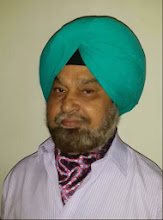Dear Residents,
Greetings of the Festive Season!
Back again!
The Sector has made good progress in the past years. Efforts of the Noida Authority and MC are helping improve various facilities in the Sector.
If you recollect, we had started e-Governance in the Sector in 2009 by launching www.RWA Sector33.blogspot.in , and later upgrading it to www.InformedCitizensForum for the NCR. It carried certain notes, guidelines, and Minutes of RWA Meetings and Proceedings, etc. It has received 'great' response nationally and internationally. It almost became a ‘learning Blog’ for communities the world over.
Pse review the World Map on the Blog showing visits in 'red dots' on www.InformedCitizensForum.com
We had started the concept of 'Residents Social Responsibility (RSR)’ on lines of CSR, and 'dos and don'ts' posted on the Blog amongst many other posts. Some of us understood it very well and looked at 'security' , 'cleanliness', 'neighborhood bon-homie holistically, and worked towards it. Others were indifferent for personal reasons.
Pse Click the following link for RSR: http://rwasector33.blogspot.in/2009/07/residents-social-responsibility-rsr.html
PM has now launched http://mygov.nic.in/ with many plans including 'Swachh Bharat Mission' and some more 'Missions'. I have joined-in in my personal capacity. Social Work with Ethics is my credo. It comes to me naturally because of my past and value system that I cherish.
In my own humble way I could support any community effort in line with the PMs mandate in my spare time.
Let us build and develop responsible citizenry!!
Happy Dusehra and Diwali!
Sukhwindar
www.svipja.com
Greetings of the Festive Season!
Back again!
The Sector has made good progress in the past years. Efforts of the Noida Authority and MC are helping improve various facilities in the Sector.
If you recollect, we had started e-Governance in the Sector in 2009 by launching www.RWA Sector33.blogspot.in , and later upgrading it to www.InformedCitizensForum for the NCR. It carried certain notes, guidelines, and Minutes of RWA Meetings and Proceedings, etc. It has received 'great' response nationally and internationally. It almost became a ‘learning Blog’ for communities the world over.
Pse review the World Map on the Blog showing visits in 'red dots' on www.InformedCitizensForum.com
We had started the concept of 'Residents Social Responsibility (RSR)’ on lines of CSR, and 'dos and don'ts' posted on the Blog amongst many other posts. Some of us understood it very well and looked at 'security' , 'cleanliness', 'neighborhood bon-homie holistically, and worked towards it. Others were indifferent for personal reasons.
Pse Click the following link for RSR: http://rwasector33.blogspot.in/2009/07/residents-social-responsibility-rsr.html
PM has now launched http://mygov.nic.in/ with many plans including 'Swachh Bharat Mission' and some more 'Missions'. I have joined-in in my personal capacity. Social Work with Ethics is my credo. It comes to me naturally because of my past and value system that I cherish.
In my own humble way I could support any community effort in line with the PMs mandate in my spare time.
Let us build and develop responsible citizenry!!
Happy Dusehra and Diwali!
Sukhwindar
www.svipja.com
































